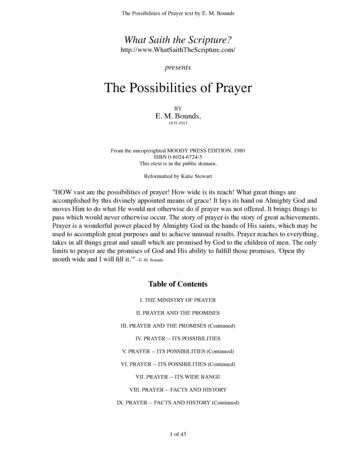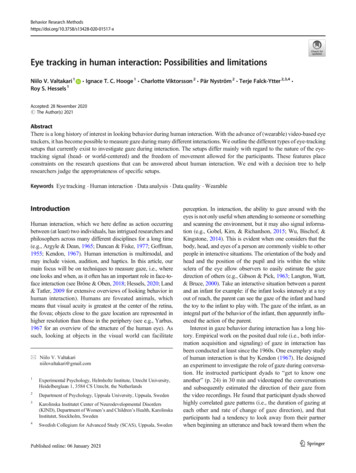
Transcription
The Possibilities of Prayer text by E. M. BoundsWhat Saith the sentsThe Possibilities of PrayerBYE. M. Bounds,1835-1913From the uncopyrighted MOODY PRESS EDITION, 1980ISBN 0-8024-6724-5This etext is in the public domain.Reformatted by Katie Stewart"HOW vast are the possibilities of prayer! How wide is its reach! What great things areaccomplished by this divinely appointed means of grace! It lays its hand on Almighty God andmoves Him to do what He would not otherwise do if prayer was not offered. It brings things topass which would never otherwise occur. The story of prayer is the story of great achievements.Prayer is a wonderful power placed by Almighty God in the hands of His saints, which may beused to accomplish great purposes and to achieve unusual results. Prayer reaches to everything,takes in all things great and small which are promised by God to the children of men. The onlylimits to prayer are the promises of God and His ability to fulfill those promises. 'Open thymouth wide and I will fill it.'" --E. M. Bounds.Table of ContentsI. THE MINISTRY OF PRAYERII. PRAYER AND THE PROMISESIII. PRAYER AND THE PROMISES (Continued)IV. PRAYER -- ITS POSSIBILITIESV. PRAYER -- ITS POSSIBILITIES (Continued)VI. PRAYER -- ITS POSSIBILITIES (Continued)VII. PRAYER -- ITS WIDE RANGEVIII. PRAYER -- FACTS AND HISTORYIX. PRAYER -- FACTS AND HISTORY (Continued)1 of 43
The Possibilities of Prayer text by E. M. BoundsX. ANSWERED PRAYERXI. ANSWERED PRAYER (Continued)XII. ANSWERED PRAYER (Continued)XIII. PRAYER MIRACLESXIV. WONDERS OF GOD THROUGH PRAYERXV. PRAYER AND DIVINE PROVIDENCEXVI. PRAYER AND DIVINE PROVIDENCE (Continued)I. THE MINISTRY OF PRAYER"Prayer should be the breath of our breathing, the thought of our thinking, the soul of our feeling, and the lifeof our living, the sound of our hearing, the growth of our growing. Prayer in its magnitude is length withoutend, width without bounds, height without top, and depth without bottom. Illimitable in its breadth,exhaustless in height, fathomless in depths and infinite in extension."--Homer W. HodgeTHE ministry of prayer has been the peculiar distinction of all of God's saints. This has been the secret of their power. Theenergy and the soul of their work has been the closet. The need of help outside of man being so great, man's natural inabilityto always judge kindly, justly, and truly, and to act the Golden Rule, so prayer is enjoined by Christ to enable man to act in allthese things according to the Divine will. By prayer, the ability is secured to feel the law of love, to speak according to thelaw of love, and to do everything in harmony with the law of love.God can help us. God is a Father. We need God's good things to help us to "do justly, to love mercy, and to walk humblybefore God." We need Divine aid to act brotherly, wisely, and nobly, and to judge truly, and charitably. God's help to do allthese things in God's way is secured by prayer. "Ask, and ye shall receive; seek, and ye shall find; knock, and it shall beopened unto you." In the marvellous output of Christian graces and duties, the result of giving ourselves wholly to God,recorded in the twelfth chapter of Romans, we have the words, "Continuing instant in prayer," preceded by "rejoicing in hope,patient in tribulation," followed by, "Distributing to the necessity of the saints, given to hospitality." Paul thus writes as ifthese rich and rare graces and unselfish duties, so sweet, bright, generous, and unselfish, had for their center and source theability to pray.This is the same word which is used of the prayer of the disciples which ushered in Pentecost with all of its rich and gloriousblessings of the Holy Spirit. In Colossians, Paul presses the word into the service of prayer again, "Continue in prayer, andwatch in the same with thanksgiving." The word in its background and root means strong, the ability to stay, and perseveresteadfast, to hold fast and firm, to give constant attention to.In Acts, chapter six, it is translated, "Give ourselves continually to prayer." There is in it constancy, courage, unfaintingperseverance. It means giving such marked attention to, and such deep concern to a thing, as will make it conspicuous andcontrolling.This is an advance in demand on "continue." Prayer is to be incessant, without intermission, assiduously, no check in desire,in spirit or in act, the spirit and the life always in the attitude of prayer. The knees may not always be bended, the lips may notalways be vocal with words of prayer, but the spirit is always in the act and intercourse of prayer.There ought to be no adjustment of life or spirit for closet hours. The closet spirit should sweetly rule and adjust all times andoccasions. Our activities and work should be performed in the same spirit which makes our devotion and which makes ourcloset time sacred. "Without intermission, incessantly, assiduously," describes an opulence, and energy, and unabated andceaseless strength and fulness of effort; like the full and exhaustless and spontaneous flow of an artesian stream. Touch theman of God who thus understands prayer, at any point, at any time, and a full current of prayer is seen flowing from him.2 of 43
The Possibilities of Prayer text by E. M. BoundsBut all these untold benefits, of which the Holy Spirit is made to us the conveyor, go back in their disposition and results toprayer. Not on a little process and a mere performance of prayer is the coming of the Holy Spirit and of His great graceconditioned, but on prayer set on fire, by an unquenchable desire, with such a sense of need as cannot be denied, with a fixeddetermination which will not let go, and which will never faint till it wins the greatest good and gets the best and last blessingGod has in store for us.The First Christ, Jesus, our Great High Priest, forever blessed and adored be His Name, was a gracious Comforter, a faithfulGuide, a gifted Teacher, a fearless Advocate, a devoted Friend, and an all powerful Intercessor. The other, "anotherComforter," the Holy Spirit, comes into all these blessed relations of fellowship, authority and aid, with all the tenderness,sweetness, fulness and efficiency of the First Christ.Was the First Christ the Christ of prayer? Did He offer prayers and supplications, with strong crying and tears unto God? DidHe seek the silence, the solitude and the darkness that He might pray unheard and unwitnessed save by heaven, in Hiswrestling agony, for man with God? Does He ever live, enthroned above at the Father's right hand, there to pray for us?Then how truly does the other Christ, the other Comforter, the Holy Spirit, represent Jesus Christ as the Christ of prayer! Thisother Christ, the Comforter, plants Himself not in the waste of the mountain nor far into the night, but in the chill and thenight of the human heart, to rouse it to the struggle, and to teach it the need and form of prayer. How the Divine Comforter,the Spirit of Truth, puts into the human heart the burden of earth's almighty need, and makes the human lips give voice to itsmute and unutterable groanings!What a mighty Christ of prayer is the Holy Spirit! How He quenches every flame in the heart but the flame of heavenlydesire! How He quiets, like a weaned child, all the self-will, until in will, in brain, and in heart, and by mouth, we pray onlyas He prays. "Making intercession for the saints, according to the will of God.".II. PRAYER AND THE PROMISES"You need not utterly despair even of those who for the present 'turn again and rend you.' For ifall your arguments and persuasives fail, there is yet another remedy left, and one that isfrequently found effectual, when no other method avails. This is prayer. Therefore, whatsoeveryou desire or want, either for others or for your own soul, 'Ask, and it shall be given you.'"--John WesleyWITHOUT the promise prayer is eccentric and baseless. Without prayer, the promise is dim, voiceless, shadowy, andimpersonal. The promise makes prayer dauntless and irresistible. The Apostle Peter declares that God has given to us"exceeding great and precious promises." "Precious" and "exceeding great" promises they are, and for this very cause we areto "add to our faith," and supply virtue. It is the addition which makes the promises current and beneficial to us. It is prayerwhich makes the promises weighty, precious and practical. The Apostle Paul did not hesitate to declare that God's grace sorichly promised was made operative and efficient by prayer. "Ye also helping together by prayer for us."The promises of God are "exceeding great and precious," words which clearly indicate their great value and their broad reach,as grounds upon which to base our expectations in praying. Howsoever exceeding great and precious they are, theirrealization, the possibility and condition of that realization, are based on prayer. How glorious are these promises to thebelieving saints and to the whole Church! How the brightness and bloom, the fruitage and cloudless midday glory of thefuture beam on us through the promises of God! Yet these promises never brought hope to bloom or fruit to a prayerlessheart. Neither could these promises, were they a thousandfold increased in number and preciousness, bring millennium gloryto a prayerless Church. Prayer makes the promise rich, fruitful and a conscious reality.Prayer as a spiritual energy, and illustrated in its enlarged and mighty working, makes way for and brings into practicalrealization the promises of God.God's promises cover all things which pertain to life and godliness, which relate to body and soul, which have to do with time3 of 43
The Possibilities of Prayer text by E. M. Boundsand eternity. These promises bless the present and stretch out in their benefactions to the illimitable and eternal future. Prayerholds these promises in keeping and in fruition. Promises are God's golden fruit to be plucked by the hand of prayer. Promisesare God's incorruptible seed, to be sown and tilled by prayer.Prayer and the promises are interdependent. The promise inspires and energizes prayer, but prayer locates the promise, andgives it realization and location. The promise is like the blessed rain falling in full showers, but prayer, like the pipes, whichtransmit, preserve and direct the rain, localizes and precipitates these promises, until they become local and personal, andbless, refresh and fertilize. Prayer takes hold of the promise and conducts it to its marvellous ends, removes the obstacles, andmakes a highway for the promise to its glorious fulfillment.While God's promises are "exceeding great and precious," they are specific, clear and personal. How pointed and plain God'spromise to Abraham:"And the angel of the Lord called unto Abraham out of heaven the second time, and said, By myself have I sworn,saith the Lord, for because thou hast done this thing, and hast not withheld thy son, thine only son; that in blessing Iwill bless thee, and in multiplying I will multiply thy seed as the stars of heaven, and as the sand which is upon theseashore; and thy seed shall possess the gate of his enemies; and in thy seed shall all the nations of the earth beblessed; because thou hast obeyed my voice."But Rebekah through whom the promise is to flow is childless. Her barren womb forms an invincible obstacle to thefulfillment of God's promise. But in the course of time children are born to her.Isaac becomes a man of prayer through whom the promise is to be realized, and so we read:"And Isaac entreated the Lord for his wife, because she was barren, and the Lord was entreated for him, and Rebekahhis wife conceived."Isaac's praying opened the way for the fulfilment of God's promise, and carried it on to its marvellous fulfillment, and madethe promise effectual in bringing forth marvellous results.God spoke to Jacob and made definite promises to him:"Return unto the land of thy fathers, and to thy kindred, and I will be with thee."Jacob promptly moves out on the promise, but Esau confronts him with his awakened vengeance and his murderous intention,more dreadful because of the long years, unappeased and waiting. Jacob throws himself directly on God's promise by a nightof prayer, first in quietude and calmness, and then when the stillness, the loneliness and the darkness of the night are uponhim, he makes the all-night wrestling prayer."With thee I mean all night to stay,And wrestle till the break of day."God's being is involved, His promise is at stake, and much is involved in the issue. Esau's temper, his conduct and hischaracter are involved. It is a notable occasion. Much depends upon it. Jacob pursues his case and presses his plea with greatstruggles and hard wrestling. It is the highest form of importunity. But the victory is gained at last. His name and nature arechanged and he becomes a new and different man. Jacob himself is saved first of all. He is blessed in his life and soul. Butmore still is accomplished. Esau undergoes a radical change of mind. He who came forth with hate and revenge in his heartagainst his own brother, seeking Jacob's destruction, is strangely and wonderfully affected, and he is changed and his wholeattitude toward his brother becomes radically different. And when the two brothers meet, love takes the place of fear and hate,and they vie with each other in showing true brotherly affection.The promise of God is fulfilled. But it took that all night of importunate praying to do the deed. It took that fearful night ofwrestling on Jacob's part to make the promise sure and cause it to bear fruit. Prayer wrought the marvellous deed. So prayerof the same kind will produce like results in this day. It was God's promise and Jacob's praying which crowned and crowdedthe results so wondrously."Go show thyself to Ahab and I will send rain on the earth," was God's command and promise to His servant Elijah after thesore famine had cursed the land. Many glorious results marked that day of heroic faith and dauntless courage on Elijah's part.4 of 43
The Possibilities of Prayer text by E. M. BoundsThe sublime issue with Israel had been successful, the fire had fallen, Israel had been reclaimed, the prophets of Baal hadbeen killed, but there was no rain. The one thing, the only thing, which God had promised, had not been given. The day wasdeclining, and the awestruck crowds were faint, and yet held by an invisible hand.Elijah turns from Israel to God and from Baal to the one source of help for a final issue and a final victory. But seven times isthe restless eagerness of the prophet stayed. Not till the seventh repeated time is his vigilance rewarded and the promisepressed to its final fulfillment. Elijah's fiery, relentless praying bore to its triumphant results the promise of God, and raindescended in full showers."Thy promise, Lord, is ever sure,And they that in Thy house would dwellThat happy station to secure,Must still in holiness excel."Our prayers are too little and feeble to execute the purposes or to claim the promises of God with appropriating power.Marvellous purposes need marvellous praying to execute them. Miracle-making promises need miracle-making praying torealize them. Only Divine praying can operate Divine promises or carry out Divine purposes. How great, how sublime, andhow exalted are the promises God makes to His people! How eternal are the purposes of God! Why are we so impoverishedin experience and so low in life when God's promises are so "exceeding great and precious"? Why do the eternal purposes ofGod move so tardily? Why are they so poorly executed? Our failure to appropriate the Divine promises and rest our faith onthem, and to pray believingly is the solution. "We have not because we ask not." "We ask and receive not because we askamiss."Prayer is based on the purpose and promise of God. Prayer is submission to God. Prayer has no sigh of disloyalty againstGod's will. It may cry out against the bitterness and the dread weight of an hour of unutterable anguish: "If it be possible, letthis cup pass from me." But it is surcharged with the sweetest and promptest submission. "Yet not my will, but thine bedone."But prayer in its usual uniform and deep current is conscious conformity to God's will, based upon the direct promise ofGod's Word, and under the illumination and application of the Holy Spirit. Nothing is surer than that the Word of God is thesure foundation of prayer. We pray just as we believe God's Word. Prayer is based directly and specifically upon God'srevealed promises in Christ Jesus. It has no other ground upon which to base its plea. All else is shadowy, sandy, fickle. Notour feelings, not our merits, not our works, but God's promise is the basis of faith and the solid ground of prayer."Now I have found the ground whereinSure my soul's anchor may remain;The wounds of Jesus -- for my sin,Before the world's foundation slain."The converse of this proposition is also true. God's promises are dependent and conditioned upon prayer to appropriate themand make them a conscious realization. The promises are inwrought in us, appropriated by us, and held in the arms of faith byprayer. Let it be noted that prayer gives the promises their efficiency, localizes and appropriates them, and utilizes them.Prayer puts the promises to practical and present uses. Prayer puts the promises as the seed in the fructifying soil. Promises,like the rain, are general. Prayer embodies, precipitates, and locates them for personal use. Prayer goes by faith into the greatfruit orchard of God's exceeding great and precious promises, and with hand and heart picks the ripest and richest fruit. Thepromises, like electricity, may sparkle and dazzle and yet be impotent for good till these dynamic, life-giving currents arechained by prayer, and are made the mighty forces which move and bless.III. PRAYER AND THE PROMISES (Continued)"Every promise of Scripture is a writing of God, which may be pleaded before Him with this reasonablerequest: 'Do as Thou hast said.' The Creator will not cheat His creature who depends upon His truth; and, farmore, the Heavenly Father will not break His word to His own child. 'Remember the word unto Thy servant,5 of 43
The Possibilities of Prayer text by E. M. Boundson which Thou hast caused me to hope,' is most prevalent pleading. It is a double argument: It is Thy Word,wilt Thou not keep it? Why hast Thou spoken of it if Thou wilt not make it good? Thou hast caused me tohope in it; wilt Thou disappoint the hope which Thou hast Thyself begotten in me?"--C. H. SpurgeonTHE great promises find their fulfillment along the lines of prayer. They inspire prayer, and through prayer the promises flowout to their full realization and bear their ripest fruit.The magnificent and sanctifying promise in Ezekiel, thirty-sixth chapter, a promise finding its full, ripe, and richest fruit inthe New Testament, is an illustration of how the promise waits on prayer:"Then will I sprinkle clean water upon you, and ye shall be clean; from all your filthiness, and from all your idols will Icleanse you. A new heart also will I give you, and a new spirit will I put within you; and I will take away the stony heart outof your flesh, and I will give you a heart of flesh. And I will put my Spirit within you, and cause you to walk in my statutes,and ye shall keep my judgments and do them. And ye shall dwell in the land that I gave to your fathers; and ye shall be mypeople, and I will be your God."And concerning this promise, and this work, God definitely says:"I will yet for this be inquired of by the house of Israel, to do it for them."The more truly men have prayed for these rich things, the more fully have they entered into this exceeding great and preciouspromise, for in its initial, and final results as well as in all of its processes, realized, it is entirely dependent on prayer."Give me a new, a perfect heart,From doubt, and fear, and sorrow free;The mind which was in Christ impart,And let my spirit cleave to thee."O take this heart of stone away!Thy sway it doth not, cannot own;In me no longer let it stay;O take away this heart of stone!"No new heart ever throbbed with its pulsations of Divine life in one whose lips have never sought in prayer with contritespirit, that precious boon of a perfect heart of love and cleanness. God never has put His Spirit into the realm of a humanheart which had never invoked by ardent praying the coming and indwelling of the Holy Spirit. A prayerless spirit has noaffinity for a clean heart. Prayer and a pure heart go hand in hand. Purity of heart follows praying, while prayer is the natural,spontaneous outflowing of a heart made clean by the blood of Jesus Christ.In this connection let it be noted that God's promises are always personal and specific. They are not general, indefinite, vague.They do not have to do with multitudes and classes of people in a mass, but are directed to individuals. They deal withpersons. Each believer can claim the promise as his own. God deals with each one personally. So that every saint can put thepromises to the test. "Prove me now herewith, saith the Lord." No need of generalizing, nor of being lost in vagueness. Thepraying saint has the right to put his hand upon the promise and claim it as his own, one made especially to him, and oneintended to embrace all his needs, present and future."Though troubles assail,And dangers affright,Though friends should all fail,And foes all unite,Yet one thing secures us,Whatever betide,The promise assures us,The Lord will provide."6 of 43
The Possibilities of Prayer text by E. M. BoundsJeremiah once said, speaking of the captivity of Israel and of its ending, speaking for Almighty God:"After seventy years be accomplished at Babylon, I will visit you, and will perform my good word toward you, incausing you to return to this place."But this strong and definite promise of God was accompanied by these words, coupling the promise with prayer: "Then shallye call upon me, and ye shall go and pray unto me, and I will hearken unto you. And ye shall seek me and find me, when yeshall search for me with all your heart." This seems to indicate very clearly that the promise was dependent for its fulfillmenton prayer.In Daniel we have this record, "I, Daniel, understood by books the number of the years whereof the word of the Lord came toJeremiah, the prophet, that he would accomplish seventy years in the desolations of Jerusalem. And I set my face unto theLord God to seek by prayer and supplications with fastings and sackcloth and ashes."So Daniel, as the time of the captivity was expiring, set himself in mighty prayer in order that the promise should be fulfilledand the captivity be brought to an end. It was God's promise by Jeremiah and Daniel's praying which broke the chains ofBabylonish captivity, set Israel free and brought God's ancient people back to their native land. The promise and prayer wenttogether to carry out God's purpose and to execute His plans.God had promised through His prophets that the coming Messiah should have a forerunner. How many homes and wombs inIsrael had longed for the coming to them of this great honour! Perchance Zacharias and Elizabeth were the only ones whowere trying to realize by prayer this great dignity and blessing. At least we do know that the angel said to Zacharias, as heannounced to him the coming of this great personage, "Thy prayer is heard." It was then that the word of the Lord as spokenby the prophets and the prayer of the old priest and his wife brought John the Baptist into the withered womb, and into thechildless home of Zacharias and Elizabeth.The promise given to Paul, engraven on his apostolic commission, as related by him after his arrest in Jerusalem, when hewas making his defense before King Agrippa, was on this wise: "Delivering thee from the people and from the Gentiles, untowhom I now send thee.'' How did Paul make this promise efficient? How did he make the promise real? Here is the answer. Introuble by men, Jew and Gentile, pressed by them sorely, he writes to his brethren at Rome, with a pressing request forprayer:"Now I beseech you, brethren, for the Lord Jesus Christ's sake, and for the love of the Spirit, that ye strive togetherwith me in your prayers to God for me; that I may be delivered from them that do not believe in Judea."Their prayers, united with his prayer, were to secure his deliverance and secure his safety, and were also to make the apostolicpromise vital and cause it to be fully realized.All is to be sanctified and realized by the Word of God and prayer. God's deep and wide river of promise will turn into thedeadly miasma or be lost in the morass, if we do not utilize these promises by prayer, and receive their full and life-givingwaters into our hearts.The promise of the Holy Spirit to the disciples was in a very marked way the "Promise of the Father," but it was only realizedafter many days of continued and importunate praying. The promise was clear and definite that the disciples should be enduedwith power from on high, but as a condition of receiving that power of the Holy Spirit, they were instructed to "tarry in thecity of Jerusalem till ye be endued with power from on high." The fulfillment of the promise depended upon the "tarrying."The promise of this "enduement of power" was made sure by prayer. Prayer sealed it to glorious results. So we find it written,"These continued with one accord, in prayer and supplication, with the women." And it is significant that it was while theywere praying, resting their expectations on the surety of the promise, that the Holy Spirit fell upon them and they were all"filled with the Holy Ghost." The promise and the prayer went hand in hand.After Jesus Christ made this large and definite promise to His disciples, He ascended on high, and was seated at His Father'sright hand of exaltation and power. Yet the promise given by Him of sending the Holy Spirit was not fulfilled by Hisenthronement merely, nor by the promise only, nor by the fact that the Prophet Joel had foretold with transported raptures ofthe bright day of the Spirit's coming. Neither was it that the Spirit's coming was the only hope of God's cause in this world.All these all-powerful and all-engaging reasons were not the immediate operative cause of the coming of the Holy Spirit. Thesolution is found in the attitude of the disciples. The answer is found in the fact that the disciples, with the women, spentseveral days in that upper room, in earnest, specific, continued prayer. It was prayer that brought to pass the famous day ofPentecost. And as it was then, so it can be now. Prayer can bring a Pentecost in this day if there be the same kind of praying,7 of 43
The Possibilities of Prayer text by E. M. Boundsfor the promise has not exhausted its power and vitality. The "promise of the Father" still holds good for the present-daydisciples.Prayer, mighty prayer, united, continued, earnest prayer, for nearly two weeks, brought the Holy Spirit to the Church and tothe world in Pentecostal glory and power. And mighty continued and united prayer will do the same now."Lord God, the Holy Ghost,In this accepted hour;As on the day of Pentecost,Descend in all Thy power."We meet with one accord,In our appointed place,And wait the promise of our Lord,The Spirit of all grace."Nor must it be passed by that the promises of God to sinners of every kind and degree are equally sure and steadfast, and aremade real and true by the earnest cries of all true penitents. It is just as true with the Divine promises made to the unsavedwhen they repent and seek God, that they are realized in answer to the prayers of broken-hearted sinners, as it is true that thepromises to believers are realized in answer to their prayers. The promise of pardon and peace was the basis of the prayers ofSaul of Tarsus during those days of darkness and distress in the house of Judas, when the Lord told Ananias in order to allayhis fears, "Behold he prayeth."The promise of mercy and an abundant pardon is tied up with seeking God and caring upon Him by Isaiah:"Seek ye the Lord while he may be found, and call ye upon him while he is near. Let the wicked forsake his way andthe unrighteous man his thoughts; and let him return unto the Lord, and he will have mercy, and to our God, for hewill abundantly pardon."The praying sinner receives mercy because his prayer is grounded on the promise of pardon made by Him whose right it is topardon guilty sinners. The penitent seeker after God obtains mercy because there is a definite promise of mercy to all whoseek the Lord in repentance and faith. Prayer always brings forgiveness to the seeking soul. The abundant pardon isdependent upon the promise made real by the promise of God to the sinner.While salvation is promised to him who believes, the believing sinner is always a praying sinner. God has no promise ofpardon for a prayerless sinner just as He has no promise for the prayerless professor of religion. "Behold he prayeth" is notonly the unfailing sign of sincerity and the evidence that the sinner is proceeding in the right way to find God, but it is theunfailing prophecy of an abundant pardon. Get the sinner to praying according to the Divine promise, and he then is near thekingdom of God. The very best sign of the returning prodigal is that he confesses his sins and begins to ask for the lowliestplace in his father's house.It is the Divine promise of mercy, of forgiveness and of adoption which gives the poor sinner hope. This encourages him topray. This moves him in distress to cry out, "Jesus, thou Son of David, have mercy upon me.""Thy promise is my only plea,With this I venture nigh;Thou call'st the burdened soul to Thee,And such, O Lord, am I."How large are the promises made to the saint! How great the promises given to poor, hungry-hearted, lost sinners, ruine
The Possibilities of Prayer BY E. M. Bounds, 1835-1913 From the uncopyrighted MOODY PRESS EDITION, 1980 ISBN 0-8024-6724-5 This etext is in the public domain. Reformatted by Katie Stewart "HOW vast are the possibilities of pray











